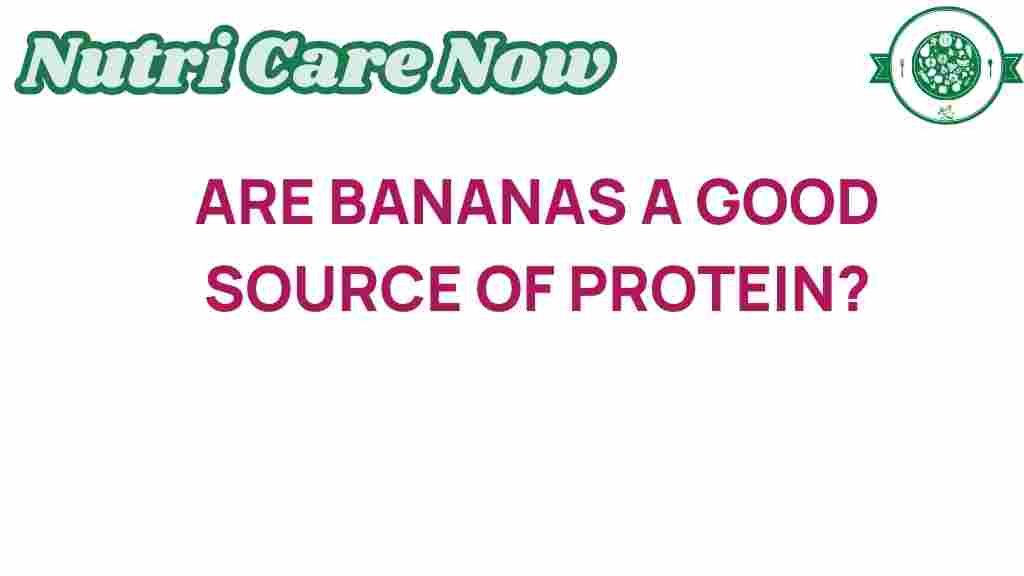Unveiling the Truth: Are Bananas a Good Source of Protein?
When it comes to fruits, bananas often steal the spotlight for their convenience, taste, and numerous health benefits. However, a common question arises among health enthusiasts and fitness aficionados: are bananas a good source of protein? In this article, we will delve into the nutritional profile of bananas, their protein content, and how they fit into a balanced diet, especially for those pursuing muscle recovery or following a plant-based lifestyle.
Understanding the Nutritional Profile of Bananas
Bananas are a popular fruit known for their natural sweetness and creamy texture. They are a rich source of several vital nutrients, including:
- Vitamins: Bananas are high in vitamin C, vitamin B6, and other essential vitamins.
- Minerals: They provide potassium, magnesium, and small amounts of iron and calcium.
- Fiber: Bananas are an excellent source of dietary fiber, which aids digestion.
However, when it comes to protein content, bananas are relatively low. A medium-sized banana contains approximately 1.3 grams of protein. While this is not negligible, it’s important to consider the protein requirements for different diets.
Bananas and Protein: What You Need to Know
Protein is an essential macronutrient that plays a crucial role in muscle repair, growth, and overall health. It is found in various dietary sources, including:
- Animal products: meat, fish, eggs, and dairy.
- Plant-based sources: legumes, nuts, seeds, and whole grains.
Given that bananas are primarily composed of carbohydrates, they should not be relied upon as a primary protein source. Instead, they can complement a balanced diet that includes adequate protein from other sources.
The Health Benefits of Bananas
Despite their low protein content, bananas offer numerous health benefits:
- Energy Boost: The natural sugars in bananas provide a quick source of energy, making them an excellent pre-workout snack.
- Improved Digestion: The dietary fiber in bananas aids in digestive health and can help prevent constipation.
- Heart Health: The potassium in bananas is essential for maintaining healthy blood pressure levels.
- Muscle Recovery: After a workout, bananas can help replenish glycogen stores and provide necessary nutrients for muscle repair.
Incorporating Bananas into Your Diet
To reap the health benefits of bananas while ensuring adequate protein intake, consider the following strategies:
- Pairing with Protein-Rich Foods: Combine bananas with yogurt, nut butter, or protein shakes to enhance protein intake.
- Banana Smoothies: Blend bananas with spinach, protein powder, and other fruits for a nutritious smoothie.
- Oatmeal Toppings: Slice bananas over oatmeal or cereal for added flavor and nutrients.
Protein Sources for Muscle Recovery
For those focused on muscle recovery, it’s crucial to include adequate protein in your diet. Here are some excellent dietary sources:
- Legumes: Beans, lentils, and chickpeas are excellent plant-based protein sources.
- Nuts and Seeds: Almonds, chia seeds, and hemp seeds offer healthy fats and protein.
- Whole Grains: Quinoa, brown rice, and oats provide both carbohydrates and protein.
- Plant-Based Protein Powders: Options like pea protein, brown rice protein, or hemp protein can easily supplement your intake.
Addressing Common Misconceptions
Many people mistakenly believe that fruit, including bananas, cannot fit into a high-protein diet. Here are some clarifications:
- Fruit vs. Protein: While bananas are not a significant source of protein, they can be part of a balanced diet that includes protein-rich foods.
- Muscle Recovery: The carbohydrates in bananas can aid in recovery when consumed alongside protein-rich foods post-exercise.
Conclusion: The Role of Bananas in a Balanced Diet
In summary, while bananas are not a significant source of protein, they offer numerous health benefits and can play a role in a balanced diet. For individuals focused on muscle recovery or following a plant-based diet, bananas can serve as a great energy source and a complement to protein-rich foods. To maximize your nutritional intake, consider incorporating a variety of protein sources into your meals alongside the delicious and nutritious banana.
For more information on dietary sources of protein, check out this comprehensive guide.
Ultimately, bananas can be a valuable part of your diet, promoting overall health and well-being while you ensure you meet your protein needs through a variety of other foods.
Remember, achieving a balanced diet is key to maintaining health, supporting muscle recovery, and enjoying the delicious flavors that fruits like bananas provide!
This article is in the category Diet and created by NutriCareNow Team

1 thought on “Unveiling the Truth: Are Bananas a Good Source of Protein?”